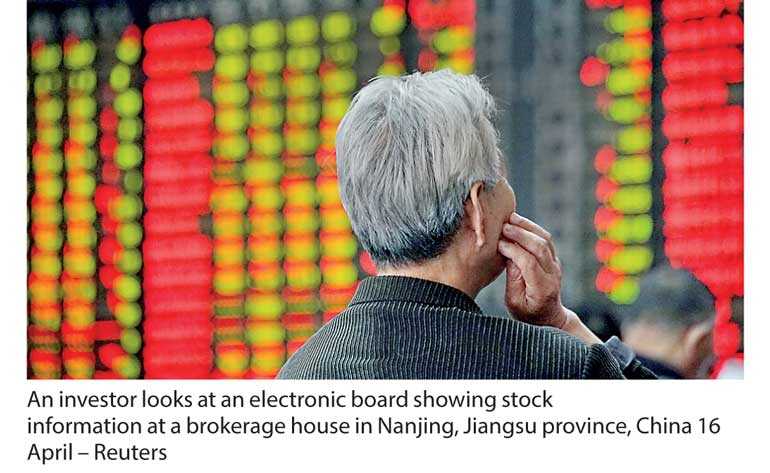Saturday Feb 21, 2026
Saturday Feb 21, 2026
Wednesday, 2 May 2018 00:14 - - {{hitsCtrl.values.hits}}
 TOKYO (Reuters): US stock futures edged up and Australian shares hit seven-week highs on Tuesday after the United States postponed the imposition of steel and aluminium tariffs on Canada, the European Union and Mexico, and offered permanent exemptions for several other allies.
TOKYO (Reuters): US stock futures edged up and Australian shares hit seven-week highs on Tuesday after the United States postponed the imposition of steel and aluminium tariffs on Canada, the European Union and Mexico, and offered permanent exemptions for several other allies.
Spread-betters also expected Britain’s FTSE to creep ahead in opening trade.
Still, uncertainty over an expanding trade dispute between the United States and China as well as worries that Washington may abandon a 2015 international nuclear deal with Iran kept investors on edge. A high-level US trade delegation will be in Beijing for meetings later this week.
S&P mini futures ticked up 0.2%, erasing an earlier loss of 0.2%.
Japan’s Nikkei rose 0.2% while Australian shares gained 0.6%, hitting their highest level since mid-March.
MSCI’s dollar-denominated index of Asia-Pacific shares outside Japan was down 0.1% though only Australia and New Zealand are open. Many markets in Europe and Latin America will be closed on Tuesday as well for public holidays.
U.S. shares lost steam late on Monday as worries about rising costs for companies kept investors on edge, despite solid corporate earnings and strong economic data.
Analysts expect S&P500 companies to report 24.6% growth in profits in the January-March quarter, according to Thomson Reuters data.
Yet rising US bond yields and commodity prices pointed to higher costs down the road, with concerns about trade frictions and rising tension in the Middle East seen as potentially amplifying the cost challenge.
An earnings announcement due later on Tuesday from Apple, the world’s largest company by market capitalisation, is attracting close attention, given speculation the sales of its flagship iPhone X have been sluggish.
“Earnings have been really strong so far. Microsoft and Amazon had a bumper quarter. The only concern has been Apple, which has been said to be lacklustre. Hopefully, unless they come up with downbeat guidance, the market may take it in stride,” said Hirokazu Kabeya, chief global strategist at Daiwa Securities.
The market got a little relief when the United States decided to postpone the start date for steel and aluminium tariffs against the European Union, Canada and Mexico to June.
The United States also reached agreements in principle on tariffs with some other countries, including Australia and Brazil.
The news, first reported by the Wall Street Journal, lifted worries the exemptions would expire on Tuesday, easing investors’ worst fears.
“Markets are kind of expecting the Trump way of negotiation to continue. So I do not think markets are overly concerned about them at this point,” said Masahiro Ichikawa, senior strategist at Sumitomo Mitsui Asset Management.
In the currency market, the euro traded at $1.2078, not far from 3 12-month low of $1.2055 touched on Friday, after weaker-than-expected German retail sales figures.
Although the data is known to be volatile and is often revised, it added to recent signs that Germany’s economy could be losing some momentum after last year’s surprisingly strong growth. The dollar has been supported against many other currencies thanks to the relative strength of U.S. economy and its yield advantage.
The Federal Reserve is expected to keep interest rates on hold at its two-day policy meeting starting later on Tuesday, with a June hike already priced in.
The British pound stood at $1.3753, having hit a two-month low of $1.3715 on Monday, as recent data suggested a rate hike by the Bank of England this month, once almost seen as a certainty, could be delayed.
The dollar changed hands at 109.25 yen, near Friday’s 2 12-month high of 109.54.
The Australian dollar stood at $0.7540, near Monday’s 4 12-month low of $0.75255 after the Australian central bank kept its policy on hold as expected.
Oil prices held firm near 3-12-year highs after Israeli Prime Minister Benjamin Netanyahu stepped up pressure on the United States to pull out of an international nuclear deal with Iran, presenting what he said was evidence of a secret Iranian nuclear weapons program.
Some intelligence experts and diplomats said he did not seem to have presented a “smoking gun” showing that Iran had violated the agreement and Iran dismissed Netanyahu’s accusations, calling them propaganda.
But US President Donald Trump, who has threatened to pull the United States out of the international deal unless it is renegotiated by 12 May, repeated his criticism of the deal after Netanyahu’s presentation, suggesting he backed the Israeli leader’s remarks.
The White House said on Monday that the information provided by Israel on Iran’s nuclear program provides “new and compelling details”.
US crude futures traded up slightly at $68.72 per barrel, not far from last month’s peak of $69.56, its highest level since late 2014.
Brent crude futures were $74.84 per barrel, near the 3 12-year high of $75.47 a barrel set last week.